Uncover India's Hidden Treasures: 14 Savvy Tips for Budget-Friendly Adventures
India's kaleidoscope of colors, aromas, and ancient wonders beckons. This vast and vibrant country offers a wealth of unforgettable experiences that won't empty your wallet. From the snow-capped Himalayas to Goa's sun-kissed shores, let's dive into 14 ingenious ways to make your rupees stretch further while immersing yourself in the magic of India!
India
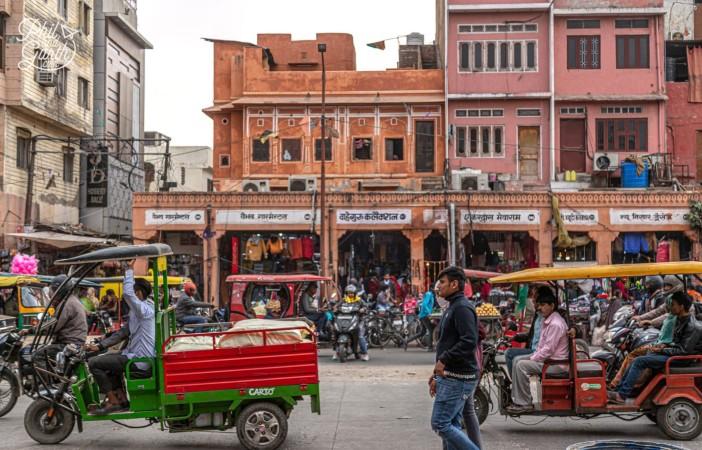
1. Timing is Everything: Chase the Off-Season Deals
Jaipur's pink-hued streets await, minus the tourist throngs. While winter months from November to March are popular (and pricier), consider visiting during the shoulder seasons. April and October can offer a sweet spot of decent weather and smaller crowds. Yes, summer can be scorching in some parts, but it's the perfect time to escape to the cool embrace of hill stations like Darjeeling or Shimla.
Priya Sharma, a seasoned tour guide from Delhi, advises, "Late September or early October is ideal. The monsoon's waning, prices are lower, and you can catch amazing festivals like Dussehra."
Pro tip: For popular spots like Goa or Kerala, aim for the start or end of their peak seasons. You'll still enjoy great weather while snagging some bargains.
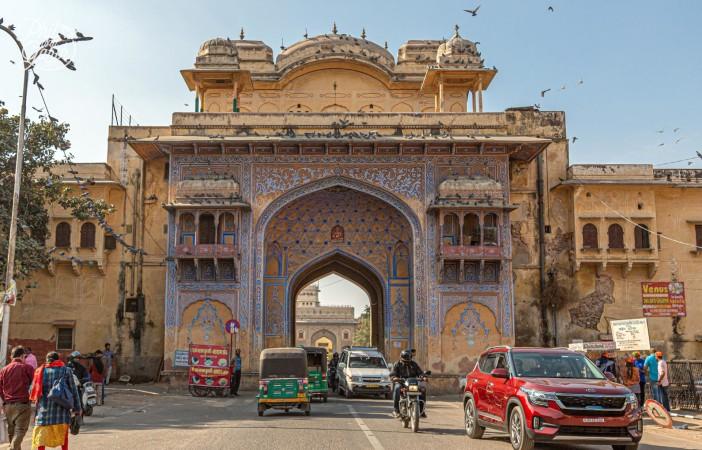
The Nakkarkhana Gate looking towards the City Palace in Jaipur - © philandgarth
2. Embrace the Night Train Adventure
As the sun dips below the horizon, a different side of India comes alive – and so does one of the best budget travel hacks. Overnight trains are not just a mode of transport; they're a cultural experience and a clever way to save on accommodation costs.
Drift off to sleep as the rhythmic clatter of wheels on tracks provides a soothing lullaby, only to wake up in a new city, ready to explore. It's like teleporting, but with a dash of adventure!
Opt for the 3AC (three-tier air-conditioned) class for a good balance of comfort and affordability. You'll get a comfortable berth, clean bedding, and the chance to chat with fellow travelers.
Mark Thompson, a backpacker from Australia, shares, "Taking overnight trains saved me hundreds of dollars on hotels. Plus, the conversations I had with locals in my compartment were priceless."
Remember to book in advance, especially during peak seasons or festivals. The Indian Railways website opens bookings 120 days before the journey date, and popular routes fill up fast.
3. Hostels: Your Home Away From Home
Gone are the days when budget accommodation meant sacrificing comfort. India's burgeoning hostel scene is redefining affordable stays with style and social vibes.
From the bustling streets of Mumbai to the serene backwaters of Kerala, you'll find hostels that offer more than just a bed. Think rooftop yoga sessions, cooking classes, and instant friendships with fellow globetrotters.
Chains like Zostel and The Hosteller have properties across the country, offering clean, comfortable dorms and private rooms at wallet-friendly prices. Expect to pay anywhere from ₹400 to ₹1000 per night, depending on the location and room type.
But the real value? The wealth of local knowledge you'll gain. Hostel staff are often young locals eager to share insider tips on the best street food joints or hidden gems in the city.
4. Street Food: A Gastronomic Adventure on a Budget
If there's one thing that defines India, it's the tantalizing aromas wafting from every street corner. From crispy vada pav in Mumbai to melt-in-your-mouth kebabs in Lucknow, street food is not just a cheap eat – it's a cultural immersion.
Rahul Gupta, a food blogger from Kolkata, insists, "To truly understand a city's soul, you must taste its street food. Each region has its specialties, and the flavors tell stories of history and tradition."
Look for busy stalls with a high turnover – it's a good sign of both popularity and freshness. A hearty meal can cost as little as ₹50-100, leaving you with a happy tummy and a happier wallet.
For the cautious eater, stick to vegetarian options or foods cooked at high temperatures. And don't shy away from asking locals for recommendations – they're usually more than happy to guide you to their favorite spots.
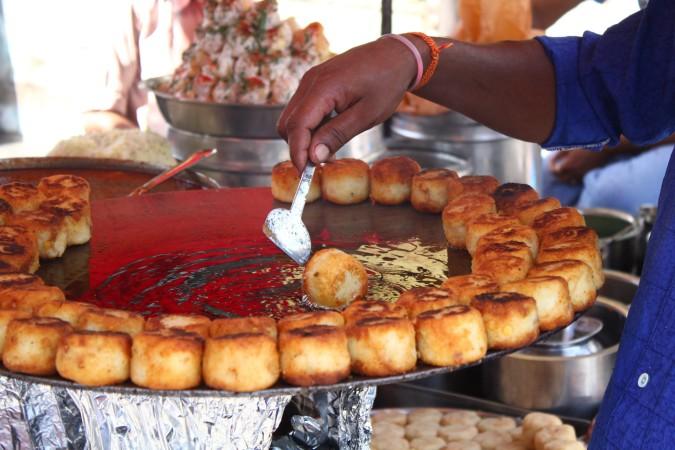
Mumbai street food - © gather
5. Master the Art of Haggling
Haggling in India is more than just a way to save money – it's a cultural exchange, a dance of words and smiles. Whether you're browsing colorful textiles in Rajasthan or hunting for spices in Kerala, a bit of friendly negotiation can lead to significant savings.
Start by offering about 40-50% of the initial asking price and work your way up from there. Keep it lighthearted and remember – it's not about winning, but finding a price that's fair for both parties.
Sunita Patel, a shopkeeper in Udaipur, explains, "Haggling is expected in markets. But always do it with a smile. If we can't agree on a price, it's okay to walk away politely."
Remember, in fixed-price shops and government emporiums, prices are usually non-negotiable. Save your bargaining skills for local markets and street vendors.
6. Explore Off-the-Beaten-Path Destinations
While the Taj Mahal and the beaches of Goa are undoubtedly spectacular, venturing off the well-trodden tourist path can lead to both unique experiences and significant savings.
Consider swapping Mumbai for the historic charm of Ahmedabad, or trade the crowds of Jaipur for the blue-hued streets of Jodhpur. Not only will you find lower prices, but you'll also get a more authentic glimpse into local life.
These lesser-known gems often offer a more relaxed pace, allowing you to forge deeper connections with locals and fellow travelers alike.
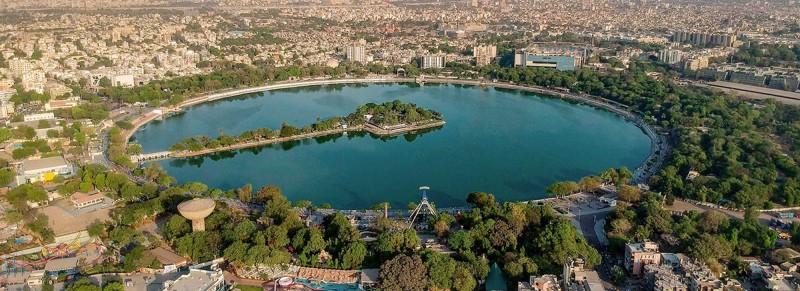
Lake Kankaria - © gather
7. Embrace Public Transport
There's no better way to experience the pulsating energy of India than by diving into its public transport system. From the iconic autorickshaws to the extensive bus networks, getting around like a local is both an adventure and a money-saver.
In cities, download ride-hailing apps like Ola or Uber for convenient and fairly priced transport. For longer journeys, state-run buses offer an economical alternative to trains, especially for last-minute travel.
Don't overlook the humble cycle rickshaw for short trips in smaller towns. It's eco-friendly, cheap, and offers a unique perspective of the streetscape.
8. Tap into Free Experiences
India is a land where every corner tells a story, and many of these tales can be experienced without spending a rupee. From wandering through vibrant markets to joining in local festivals, some of the most memorable experiences come without a price tag.
Many cities offer free walking tours led by passionate locals. These tours not only provide insights into the history and culture but also help you get your bearings in a new place.
Beaches, parks, and many religious sites are free to visit. The ghats of Varanasi, the beaches of Goa, or the serene Gurudwaras (Sikh temples) offer profound experiences that don't cost a dime.
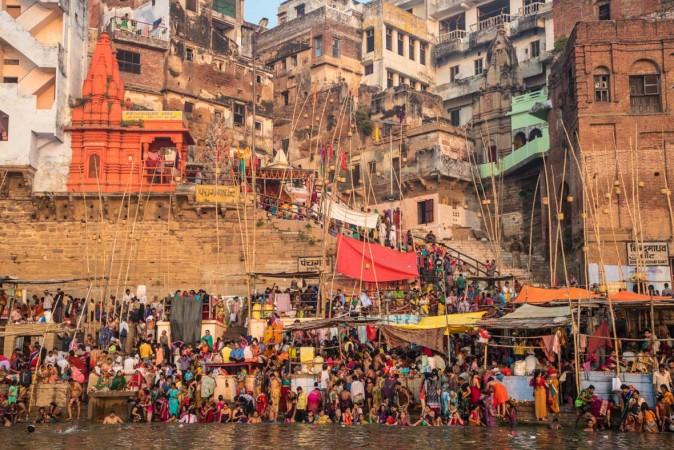
Varanasi ghats - © GARIMA GARG
9. Stay Hydrated Smartly
In the land of chai and lassi, staying hydrated is crucial – but it doesn't have to cost you. Invest in a good quality water bottle with a built-in filter, or carry water purification tablets. Most hotels and restaurants are happy to refill your bottle with filtered water for free.
Not only will this save you money, but it's also an eco-friendly choice, reducing plastic waste. Remember, tap water in India is generally not safe to drink, so always err on the side of caution.
10. Leverage Student and Senior Discounts
If you're a student or senior citizen, your ID card could be your ticket to savings across India. Many museums, historical sites, and even some transport services offer discounted rates.
The Archaeological Survey of India, which manages many historical monuments, often has significant discounts for students and seniors. Always carry your ID and don't hesitate to ask about available discounts.
11. Time Your Visit Around Festivals (Wisely)
India's calendar is dotted with colorful festivals, each offering a unique glimpse into the country's rich cultural tapestry. While some major festivals can drive up prices, others can actually be a budget traveler's delight.
Consider visiting during festivals like Holi (usually in March) or Diwali (usually in October/November). While accommodation might be pricier, you'll be treated to free street celebrations, fireworks, and an unparalleled atmosphere.
Just be sure to book your accommodation well in advance, as things can fill up quickly during popular festivals.
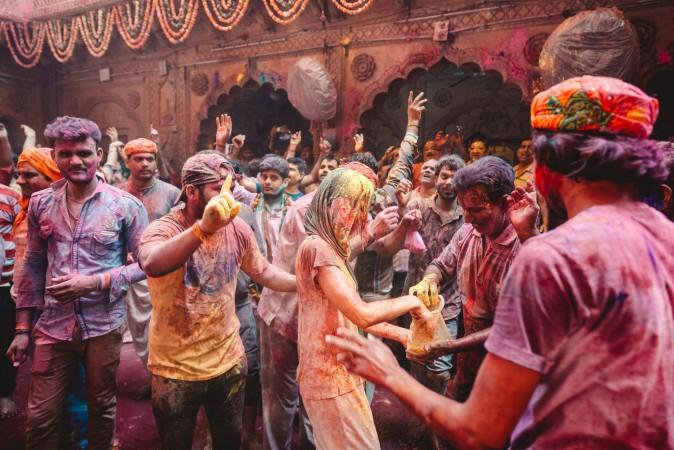
Holi festival India - © finduslost
12. Learn the Art of Slow Travel
In a country as vast and varied as India, it's tempting to try and see it all. But racing from one city to another not only drains your wallet but also robs you of truly immersing yourself in each place.
Consider spending more time in fewer places. Not only will this reduce your transportation costs, but it also allows you to discover hidden gems and potentially negotiate better rates for longer stays at guesthouses.
Tom Baker, a digital nomad from the UK, shares, "When I slowed down and spent two weeks in Rishikesh instead of two days, I not only saved money but also found a yoga retreat that changed my life."
13. Volunteer for a Unique Experience
Volunteering can be a meaningful way to engage with local communities while keeping your costs down. Many organizations offer programs where you can exchange a few hours of work for free accommodation and meals.
From teaching English in rural schools to helping at animal shelters, there's a wide range of opportunities. Websites like Workaway and HelpX are good places to start your search.
Just be sure to research thoroughly and choose reputable organizations to ensure your efforts truly benefit the local community.
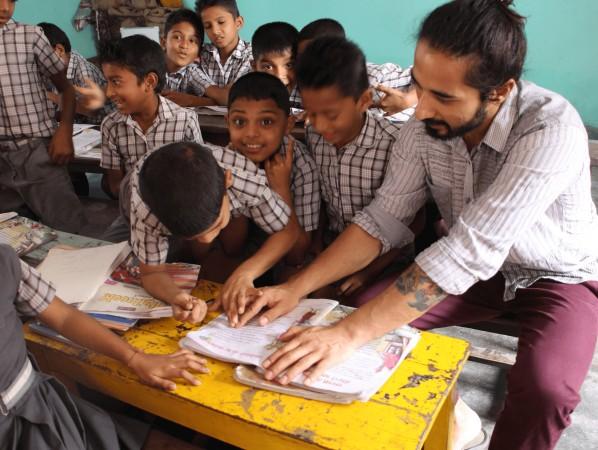
Teaching English India - © Volunteering Journeys
14. Make Friends with Technology
In today's digital age, your smartphone can be your best travel companion. Download apps like Maps.me for offline navigation, XE for currency conversion, and Google Translate to help you communicate with locals.
For calling home, use Wi-Fi and apps like WhatsApp or Skype instead of expensive international calls. And don't forget to check out travel blogs and forums for up-to-date tips from fellow budget travelers.
Conclusion
As we wrap up our journey through the realm of budget travel in India, remember that the true wealth of this incredible country lies not in lavish hotels or expensive tours, but in its warm-hearted people, rich traditions, and breathtaking diversity.
By following these tips, you're not just saving money – you're opening yourself up to more authentic experiences, deeper connections, and the kind of adventures that transform a trip into a life-changing journey.
So pack your bags, bring an open mind, and get ready to fall in love with India, one budget-friendly adventure at a time. The land of spices, colors, and ancient wisdom awaits – and it doesn't have to cost a fortune to explore it with Tweet Tours.
Remember, in India, the best things in life – a warm smile from a stranger, the first bite of a perfectly spiced curry, or the sunset over the Ganges – are often free. Happy travels!
Articles for you

Experience Aboard The RV Indochine II - A Mekong Cruise With Tweet World Travel
The RV Indochine II is a luxury river cruise ship, offering an unforgettable journey through many attractions along the Mekong River. Built in 2017, this upscale vessel combines colonial elegance with modern conveniences to create a comfortable yet stylish environment for its crew and passengers. The ship’s intimate size makes it ideal for those seeking a more personal cruising experience while exploring Vietnam and Cambodia rich culture, scenery, and heritage. Whether you're gazing at the landscape from your private balcony or enjoying authentic local cuisine, RV Indochine II promises an exotic adventure like no other.

Witness Stilt Fishing In Sri Lanka: An Eco-Tourism Experience
Sri Lanka, renowned for its stunning beaches and rich cultural heritage, harbors a unique tradition that has captivated travelers for centuries: stilt fishing. This ancient practice, passed down through generations of coastal communities, blends artistry with necessity, offering a glimpse into a way of life intimately connected to the island's coastal rhythms. Stilt fishing in Sri Lanka isn't merely a means to catch fish; it's a cultural emblem, embodying the resilience and ingenuity of Sri Lanka's fishing communities.

Make Your Trip Stress-Free With The Tweet Trip App
Embark on your next adventure with confidence by downloading the Tweet Trip App, available for both iOS and Android. This essential travel companion allows you to view your detailed itinerary, stay connected with your tour guide and fellow travelers, receive real-time updates, and provide feedback effortlessly. With features like in-app messaging, emergency assistance, and location sharing, the Tweet Trip App ensures you travel smarter, stay connected, and enjoy a seamless, worry-free journey. Get started today and make the most of your travel experience with Tweet World Travel.

Pedal Through Paradise: Unveiling Cambodia's Hidden Gems on Two Wheels
The gentle whir of bicycle wheels mingles with the distant chants of monks as you glide past emerald rice paddies stretching to the horizon. This is Cambodia - a sensory explosion waiting to be experienced on two wheels. At Tweet Tours, we believe there's no better way to immerse yourself in the Kingdom of Wonder than by bicycle.
Cambodia isn't just a destination; it's a living, breathing tapestry of ancient wonders, natural beauty, and vibrant culture. Our carefully crafted cycling tours take you beyond the typical tourist haunts, offering a unique perspective on this captivating country. Ready to clip in and discover the magic of Cambodia? Let's ride!

Trekking in the Himalayas: A Journey Through Nepal's Majestic Peaks
The Himalayas rise from the earth like colossal guardians, their snow-capped peaks piercing the sky in a display of nature's raw power and beauty. Nepal, nestled at the heart of this mountain range, serves as the gateway to some of the most breathtaking trekking experiences on the planet. Here, the air is crisp and thin, filled with the promise of adventure and the whispers of ancient tales.
With Tweet Tours, as you set foot on these hallowed trails, you're not just a traveler - you're a modern-day explorer, following in the footsteps of legendary mountaineers and age-old traders. Each step takes you further into a world where nature reigns supreme and human resilience is tested against the backdrop of some of the world's highest peaks.
From the moment your boots touch the ground in Kathmandu, you'll feel the pull of the mountains. The bustling streets of the capital, with their sensory overload of sights, sounds, and smells, soon give way to serene mountain paths where the only soundtrack is the crunch of gravel underfoot and the distant tinkling of yak bells.

Exploring Mui Ne's Wonders: Unique Attractions & Local Dishes
Nestled along the southeastern coast of Vietnam, Mui Ne emerges as a captivating gem, blending natural wonders with cultural richness. Renowned for its stunning landscapes and unique attractions, Mui Ne beckons travelers seeking both relaxation and adventure in equal measure. Mui Ne's renowned beach dunes, bustling fishing towns, and excellent local food await exploration at every turn.
The allure of Mui Ne lies not only in its pristine beaches and crystal-clear waters but also in its diverse range of activities catering to every traveler's whims. Whether you're drawn to thrilling water sports like kitesurfing and windsurfing on its dynamic shores or seeking tranquility amidst the picturesque Fairy Stream, Mui Ne promises an unforgettable journey filled with discovery.
